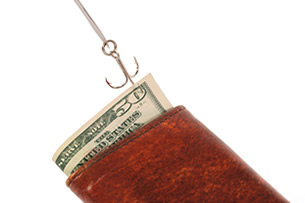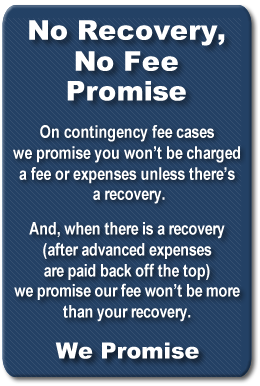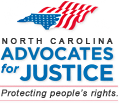North Carolina Ponzi Scheme Lawyers
What Is a Ponzi Scheme?
A Ponzi scheme is a fraudulent investment operation named after Charles Ponzi, an Italian swindler and con artist who operated in the U.S. and Canada in the 1920s. Ponzi lured investors with false promises to invest their money but simply paid existing investors with funds collected from new investors.
The Federal Bureau of Investigation (FBI) defines a Ponzi scheme as follows: “A scheme that involves the alleged payment of dividends to initial investors by using money obtained through gaining new investors. However, instead of taking the dividends from the investment and properly reinvesting it back into the market, the scammers committing the fraud will opt to take on more and more new investors to keep alive the allusion of a legitimate investment.”
Most Ponzi schemes usually unfold with some somewhat basic elements:
-
The fraudster promises investors unusually high or guaranteed short term returns on an investment without providing specific information about the opportunity
-
Common misrepresentations about the fake business venture may include descriptions of a remote enterprise involving oil wells, diamonds, or silver mines and the like
-
Early investors provide the organizer with funds and the funds provided by the subsequent investors are sent directly to the early investors at a high rate of return, creating a positive buzz among the early investors
-
The early investors become trustful and excited about the investment opportunity after receiving a high return rate quickly and begin promoting the investment scheme to their peers and family members
The problem with a Ponzi scheme, besides being illegal, is that it is doomed to collapse if it cannot find more investors to pay the returns to the previous investors. Many operate for only several years, while some may operate for decades leaving lives and families destroyed.
Ponzi scheme red flags
Even though many consumers may think Ponzi schemes are rare and easy to spot, in reality, Ponzi schemes are common and can fool even very experienced investors into investing large sums of money. According to some news outlets, authorities uncovered 46 Ponzi schemes in 2020 and 34 in 2021. If you invest your money, be aware of some Ponzi scheme red flags:
-
Promised Guaranteed high returns with little or no risk: Any investment with “guaranteed” high returns should be suspect and carefully examined. All investments carry some degree of risk.
-
Missing/Hidden Information: Excuses about missing paperwork, errors, or secretive strategies are consistent elements of investment fraud.
-
Complex strategies: Avoid any advisor who credits a highly complex investing technique for unusual success. Legitimate professionals should be able to explain clearly what they are doing. It is critical that you fully understand any investment you’re seriously considering—including what it is, what the risks are and how the investment makes money.
-
Overly consistent returns: Any investment that provides remarkably steady returns regardless of market conditions—should raise suspicions, especially during turbulent times. Understand that even the most stable investments can experience hiccups once in a while.
-
Ponzi schemes are also frequently affinity frauds where the wrongdoer exploits the inherent trust within the group by presenting a scheme to a large group of people connected by the same religious organization or the same ethnic background.
One of the largest and most widely cited Ponzi schemes was committed by Bernie Madoff. Discovered in 2008, the scheme had been in operation for over 20 years and involved over $50 billion. As was the reality with the Madoff case, Ponzi schemes are often operated by a Stock Broker or Financial Adviser. It is important you understand that just because the person you trust with your investments is employed with a known investment firm or insurance company, Ponzi schemes are often operated under the guise of a well-known employer despite heavy regulation of the financial services industry. When this is the case, you may be able to recover your investment losses from the employer.
The Ponzi scheme operator’s employer may be liable
Many Ponzi schemes are able to grow because the wrongdoer takes advantage of an investor’s trust through his association or connection to a reputable brokerage firm, insurance company, accounting firm, or law firm. These employers may be liable for investor losses if they fail to properly supervise an employee or agent, fail to question red flags, or fail to comply with their own internal or professional guidelines on how they must monitor their agents.
Trust Hemmings & Stevens’ Experienced Ponzi Scheme Attorneys
At Hemmings & Stevens, we have several years of experience in successfully handling Ponzi scheme cases in North Carolina for more than 30 clients. We understand the realization that you may be a victim of a Ponzi scheme brings strong feelings of anger and embarrassment that can overwhelm a person’s judgment and interfere with the detailed work that must be done to recover financial losses. We will provide the focused personalized service you can expect from a small and experienced law firm.
As investment fraud attorneys, we know how frustrating falling victim to a Ponzi scheme can be and will work to seek financial recovery for your case. If you’ve found yourself in this type of distressing situation, we can assist you. If you suspect you may have invested in a Ponzi scheme, contact the North Carolina Ponzi scheme lawyers at the law firm of Hemmings & Stevens, PLLC today. We offer free initial consultations and work on a contingent fee basis, which means there are no fees unless we make a recovery for you. You can call us at 919.277.0161 or contact us online . Our office is in Raleigh, but we handle investment fraud cases statewide.











